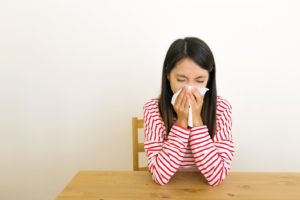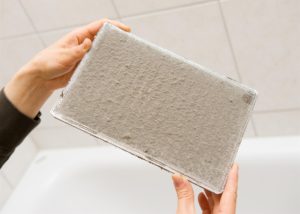Your Indoor Air May Be More Polluted Than Outside: Here’s What to Do About It
When we hear the word “pollution,” most of us tend to picture smoggy metropolitan cities like Los Angeles and Delhi, India. For the most part, we  tend to expect that the air in our homes is safer for us to breathe than the exhaust and pollen-filled air outdoors. In recent years, however, scientific data reported by the Environmental Protection Agency has begun to show that the air inside homes, offices, and other buildings can actually be more heavily polluted than the air outside.
tend to expect that the air in our homes is safer for us to breathe than the exhaust and pollen-filled air outdoors. In recent years, however, scientific data reported by the Environmental Protection Agency has begun to show that the air inside homes, offices, and other buildings can actually be more heavily polluted than the air outside.
While this is a hot topic among A/C companies, homeowners often rarely think about the quality of their indoor air. Though some are meticulous about HVAC upkeep, many are not, potentially leading to poor air quality, higher energy bills, and increased system stress.
In this article, we’ll take a look at the ways in which indoor air quality can affect health and HVAC functioning, as well as methods recommended by air conditioner companies to improve indoor air quality and properly maintain an efficient air conditioning system.
Why Does Indoor Air Need to Be Clean?
The most obvious reason indoor air quality matters is because the human body needs to be able to breathe properly. When the air in an area is full of pollutants like smoke, dust, mold, or bacteria, it creates discomfort and puts those breathing the polluted air at risk of various health concerns.
Upon immediate exposure to such pollutants, a person can experience symptoms like eye, nose and throat irritation, dizziness, fatigue, and/or  headaches. If exposed to them for years, a person can develop debilitating conditions like respiratory disease, heart disease, or even cancer.
headaches. If exposed to them for years, a person can develop debilitating conditions like respiratory disease, heart disease, or even cancer.
As anyone living in central Texas knows, allergens are another example of why the quality of indoor air is such a major concern. If you, a family member, or other regular guest suffers from allergies, the purity of your home’s air is of the utmost importance. Not only can allergies cause frustrating and uncomfortable symptoms, but in some seriously affected individuals, an allergic reaction can become an emergency.
While most pollutants are small enough to go relatively unnoticed, some pollutants are less difficult to ignore. Smoke and tar from years of indoor smoking, for example, can create a pervasive, unpleasant odor throughout every room where the air is circulated regardless of whether a smoker was present in that room. Similarly, the tar can actually deposit itself on various surfaces which eventually turn light-colored walls and objects into unsightly yellow.
Whatever the pollutants and their effects, these mostly invisible particles can wreak havoc on our homes and physical systems. Just as we tend to be concerned about the effects of outdoor pollution on the environment and wildlife, it’s important that we also consider the effects of indoor pollution on ourselves, our families, and our coworkers.
How Air Filters Help You Maintain Clean Indoor Air
One of the most important elements of a building’s HVAC system is the air filter. All of the air that flows through your home goes through this filter at a rate of approximately two times per hour. As this air passes through, the filter catches any particulate or microscopic pollutants that might otherwise be circulated throughout the rooms (though the percentage of pollutants a filter is able to capture can vary, as we’ll discuss shortly).
A clean air filter also keeps the entire HVAC system from becoming dirty, clogged, and ultimately overworked. In fact, a dirty filter is a main cause of  HVAC failure, and providing a clean air filter is the best way to maintain your system’s overall efficiency. Because you spend a large portion of your monthly energy expenses on your home’s HVAC, keeping the system running at optimal efficiency means more money in your bank account and can save you from a more costly home air conditioning replacement.
HVAC failure, and providing a clean air filter is the best way to maintain your system’s overall efficiency. Because you spend a large portion of your monthly energy expenses on your home’s HVAC, keeping the system running at optimal efficiency means more money in your bank account and can save you from a more costly home air conditioning replacement.
Different types of HVAC systems will require different sizes and types of air filters, depending on their hardware, home size, and other details. The easiest way to determine the size of filter required is to check the air return for an existing filter and read the dimensions from the edge of the filter itself. If there is no filter present, simply measure the width, length, and depth of the space so that the filter you purchase has an ideal, snug fit.
In general, homeowners use air filters containing synthetic fibers that physically capture the pollutants in the air that passes through. These filters are generally ranked for effectiveness in terms of their Minimum Efficiency Reporting Value—or MERV—rating. The higher the MERV rating, the less often the filter will need to be replaced.
Air filters come in a variety of types:
- Flat-panel fiberglass filters: the least expensive, but more geared toward HVAC system protection than to actual air quality. Generally removes less than 10% of pollutants.
- Pleated air filters: a step up, removing approximately 45% of pollutants at a cost of approximately $10 per filter.
- High-efficiency air filters: a highly practical option, capable of removing as much as 85% of pollutants from indoor air.
- High-efficiency particulate air (HEPA) filters: the highest quality, able to remove up to 98% of air pollutants. Can only be used with stand-alone air purifiers or whole-house filtration systems.
Once you’ve determined the appropriate kind of filter for your home size and system, it’s important to regularly change out the filter with a new one per manufacturer recommendations. The frequency at which you should replace your air filter depends upon a variety of factors. First, take note of the type of filter you have. Is it flat? Pleated? What kind of material is it made from? These little details will affect how your filter works and how often it will need to be replaced.
There is, of course, a ballpark range you can follow for certain kinds of filters: for most one-inch thick filters, a change every month or two may be required. For larger, three- to five-inch filters with pleated cartridges, you may only need to replace it once or twice a year. The best way to know when your filter needs to be changed is to look at it on occasion. If it looks dirty, change it!
As with most things in life, the less money you spend on your air filter, the more often you’ll probably have to change it (in other words, “you get what you pay for”). It might not be true across the board, but it’s a good thing to keep in mind.
The Importance of an Up-to-Date Air Conditioner
Making sure that your home’s air filtration and air conditioning system is up to date can help to prevent polluted air. According to a 2013 study from medical researchers in Taiwan, the use of air conditioning to reduce indoor air pollution has been directly linked to improved cardiovascular health in the general population. Clearly, properly functioning air conditioners can be much more than just a source of cool air in the summertime.
As technology has marched forward, A/C systems have marched along with it, leading to lower energy usage, new compressor technology, better fan-blade shapes, new refrigerants, and more. By upgrading your A/C on occasion through a reliable air conditioner company, you can ensure great system efficiency and improve your home’s ability to filter air (plus, a well-maintained and updated system could be a great asset if you ever need to sell).
Christianson Air Conditioning & Plumbing.: Over 65 Years of Expert Service
If you’re uncertain as to how to change your air filter, in need of a central air conditioning replacement, or properly maintain your A/C system, Christianson Air Conditioning & Plumbing is standing by! We’ve been serving Texans’ air conditioning and plumbing needs since 1950, and even offer a convenient emergency service line for each of our four locations.
To learn more about our A/C and plumbing services or to book an appointment with one of our experienced professionals, contact your local Christianson Air Conditioning & Plumbing location in Austin, San Antonio, Temple, or New Braunfels today!
Sources
https://www.epa.gov/indoor-air-quality-iaq/inside-story-guide-indoor-air-quality
https://www.angieslist.com/articles/how-often-should-you-replace-your-home-air-filter.htm
https://household-tips.thefuntimesguide.com/best_air_filters/
https://www.thisoldhouse.com/ideas/air-conditioners-really-are-getting-better
http://www.sciencedirect.com/science/article/pii/S0048969713006463



You must be logged in to post a comment.